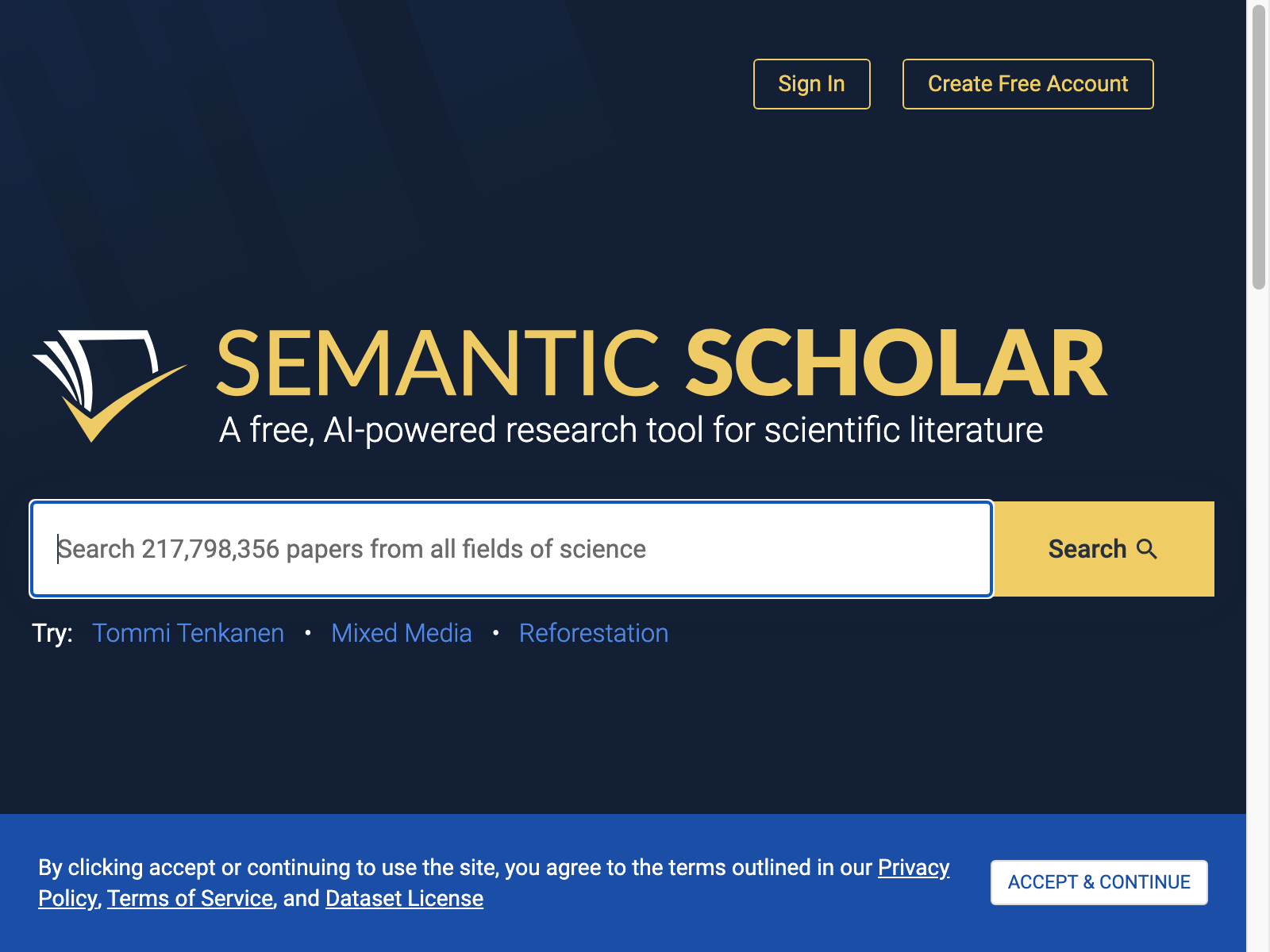"emantic Scholar: AI-Powered Research Tool

Semantic Scholar is an AI-powered research tool that helps scholars discover relevant academic literature by understanding the semantics of scientific publications.
Semantic Scholar Overview
Semantic Scholar is a groundbreaking AI-powered research tool developed by the Allen Institute for Artificial Intelligence. The platform leverages advanced natural language processing and machine learning algorithms to understand the semantic content of scientific publications, enabling users to quickly and efficiently discover relevant research.
In a detailed review, Semantic Scholar's innovative approach to research discovery has been widely praised. The tool's ability to analyze the context and meaning of academic papers, rather than relying solely on keyword searches, sets it apart from traditional literature review methods. This semantic understanding allows Semantic Scholar to surface high-quality, relevant studies that may have been overlooked using conventional search techniques.
Semantic Scholar Key Features
-
Semantic Search: Semantic Scholar's advanced search engine goes beyond simple keyword matching, using natural language processing to understand the conceptual content of research papers and provide more relevant results.
-
Citation Graphs: The platform visualizes the relationships between academic papers, allowing users to explore the connections and influence between different studies.
-
AI-Powered Recommendations: Semantic Scholar's machine learning algorithms analyze user behavior and paper content to suggest relevant publications the user may have overlooked.
-
Personalized Feeds: Users can create customized feeds to stay up-to-date with the latest research in their field of interest, based on their search history and paper interactions.
-
Automated Summaries: The tool generates concise, AI-written summaries of research papers, enabling users to quickly assess the relevance and key findings of a study.
Semantic Scholar Use Cases
Semantic Scholar is a versatile tool that can benefit researchers, students, and industry professionals alike. Some common use cases include:
- Literature Reviews: Quickly identify relevant papers and explore the connections between studies to inform a comprehensive literature review.
- Topic Exploration: Discover new research areas and emerging trends in a field of study by exploring the semantic connections between publications.
- Competitive Intelligence: Stay informed about the latest developments and research activities in a specific industry or domain.
Semantic Scholar Pros and Cons
Pros:
- Advanced semantic search capabilities to surface highly relevant research
- Intuitive citation graph visualizations to understand paper relationships
- Personalized feeds and AI-powered recommendations
- Automated paper summaries to quickly assess relevance
Cons:
- Limited coverage of non-academic publications and grey literature
- Some users may prefer more control over search parameters and filters
- Potential for bias in AI-generated recommendations
Semantic Scholar Pricing
Semantic Scholar offers the following pricing plans:
| Plan | Price |
|---|---|
| Free | $0/month |
| Pro | $10/month |
| Enterprise | Custom pricing |
The free plan provides access to the core Semantic Scholar features, while the Pro plan unlocks additional capabilities such as personalized feeds, citation alerts, and advanced search filters. Enterprise-level pricing is available for organizations and institutions.
Semantic Scholar Alternatives
While Semantic Scholar is a highly capable AI-powered research tool, there are several alternatives worth considering:
- Google Scholar: A free, widely-used search engine for academic literature, with some semantic search capabilities but less advanced AI-driven features.
- Dimensions: A comprehensive research information system that provides citation analysis, funding insights, and collaboration networks.
- Lens.org: An open-access platform that integrates multiple scholarly databases and offers advanced search and analysis tools.
Semantic Scholar FAQ
-
What types of publications does Semantic Scholar cover? Semantic Scholar primarily focuses on academic and scientific literature, including journal articles, conference papers, and preprints. The platform covers a wide range of disciplines, from the natural sciences to the humanities.
-
How does Semantic Scholar's semantic search differ from traditional keyword-based search? Semantic Scholar's search engine uses natural language processing and machine learning to understand the conceptual content and context of research papers, rather than relying solely on keyword matching. This allows the tool to surface more relevant and insightful results, even for complex queries.
-
Is Semantic Scholar free to use? Semantic Scholar offers a free basic plan that provides access to the core features of the platform. For more advanced capabilities, such as personalized feeds and citation alerts, users can subscribe to the Pro plan for $10 per month.
-
How can Semantic Scholar be integrated with other research tools? Semantic Scholar provides APIs and integration options that allow users to incorporate the platform's search and recommendation functionality into their existing research workflows and tools, such as reference managers and writing software.